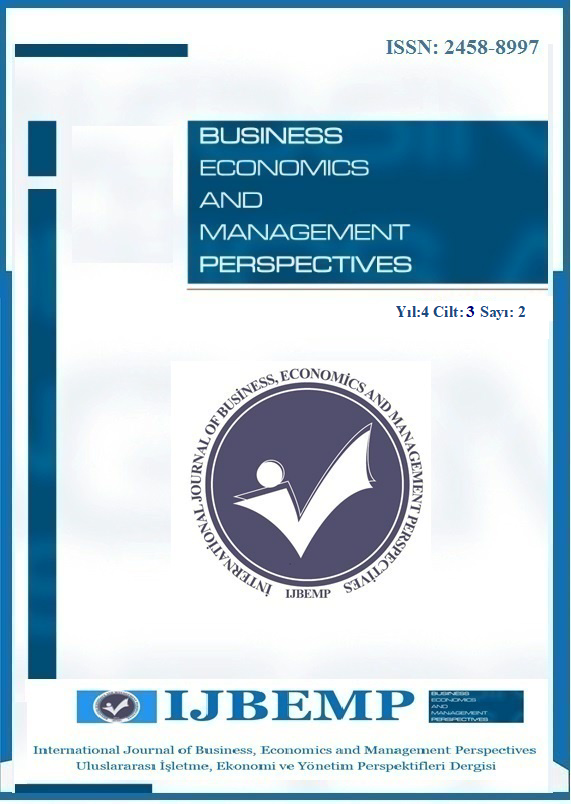Author :
Abstract
Bu araştırmanın amacı muhasebe mesleğinde etik ve mali müşavirleri etik dışı davranmaya yönelten sebepler olarak belirlenmiştir. Araştırmada Nevşehir’de bağımsız olarak görev yapan mali müşavirler ve yeminli mali müşavirler evren olarak belirlenmiştir. Araştırmada 65 meslek mensubuna anket yapılmıştır. Araştırmanın temelini oluşturan “Bir meslek mensubu olarak her zaman meslek etik kurallarına uygun hareket ederim” ifadesine verilen cevaba göre ortalama 2,95 ve standart sapması 0,944 sonucu elde edilmiştir. Nevşehir meslek mensupları, meslek etiğinin gelişmesinde etkili olan faktörün ilk sırada eğitim (ortalama 4,69); ikinci sırada ise toplumsal faktör (ortalama 4,44) olarak ifade etmişlerdir. Ayrıca, ankete katılan meslek mensuplarının etik dışı davranışta bulunmama sebepleri; 3. kişiler, (devlet, milli ruh, maddi kayıp gibi) ya da kendi vicdanları daha etkili olduğu görülmüştür. Son olarak bu çalışmanın bazı kısıtları olduğu belirtilmiş ve bu konu ile ilgili olarak gelecekte araştırma yapacaklara bazı öneriler sunulmuştur.
Keywords
Abstract
The aim of this study is determined as the ethics in accounting profession and the reasons that lead financial advisors to behave unethically. In the study, independent financial advisors and certified public accountants in Nevsehir province were defined as the universe. In the research, a survey was conducted to 65 professional members. According to the answers given to the statement that was the basis of the study, "I always act in accordance with the ethical rules of profession as a profession member", the mean was obtained as 2.95 and standard deviation as 0.944. Professionals in Nevsehir province stated that factors effecting the education in the development of professional ethics (mean 4.69) are in the first place, and the social factor is in the second place (mean 4.44). Additionally, the reason for the participant professionals to abstain from unethical behaviors was determined as their own conscience, which is more effective than third parties (such as state, national spirit, financial losses). Finally, certain limitations of this study were stated and some suggestions were made for future research studies in this subject.
Keywords
- Ayboğa, H. (2001), “Ülkemizde Muhasebe Mesleği Ve Meslek-Etiği-Ahlakı”, Ege Akademik
- Bakış Dergisi, Cilt 1, Sayı 2. Aydın, P.İ. (2002), Yönetsel Mesleki ve Örgütsel Etik. Pegem Yayıncılık, İstanbul. Aymankuy, Y. Sarıoğlan, M. (2005), “Muhasebe Meslek Mensuplarının Meslek Etiğine
- Başpınar, N.Ö. Çakıroğlu, D. (2011), Meslek Etiği, Nobel, Ankara.
- Çıngı, H. (2009), Örnekleme Kuramı (3. Baskı). Hacettepe Üniversitesi, Ankara.
- Çiçek, H. Canbaz, S. Keskin, A. (2013),
- Bakış Açıları: Kırklareli İlinde Bir Araştırma”, Tekirdağ S.M.M.M. Odası Sosyal Bilimler Dergisi, 1-20. Daştan, A. (2009), “Etik Eğitiminin Muhasebe Eğitimindeki Yeri ve Önemi: Türkiye
- Değerlendirmesi”, Marmara Üniversitesi İİBF Dergisi, Cilt: XXVI (1), Hugh, F.Mc. (1998), Ethics, Tüsiad Yayınları, İstanbul. Köseoğlu, M.A. Bektaş, Ç. (2007), İş Etiği ve Rekabet Stratejileri Yönetimi, Gazi Kitabevi,
- Ankara. Mele, D. (2005), “Ethical Education in Accounting: Integrating Rules, Values and Virtues”,
- Nakip, M. (2013), Pazarlamada Araştırma Teknikleri Veri Toplama Araçları (3. Baskı), Seçkin
- Yayıncılık, Ankara. Oyman, M. (1999), “Pazarlamada Etiksel Karar Alma”, 4. Ulusal Pazarlama Kongresi Bildiriler
- Kitabı, Mustafa Kemal Üniversitesi İ.İ.B.F, Hatay, Özdemir, E. (2003), “Liderlik ve Etik”, Uludağ Üniversitesi İktisadi ve İdari Bilimler Fakültesi
- Hacıhasanoğlu, T. (2012), “Muhasebe Meslek Mensuplarının Kişilik ve Karar
- Verme Davranışları Arasındaki İlişkiler”, Niğde Üniversitesi İİBF Dergisi, Cilt: 5, Sayı: 2, Smith, K.T. Smith, L.M. (2007), Busıness And Accountıng Ethıcs, (Çeviren: İsmail BEKÇİ),
- Süleyman Demirel Üniversitesi İktisadi ve İdari Bilimler Fakültesi, 12(3), TESMER (2010), Hukuk, Mesleki Değerler ve Etik, Temel Eğitim ve Staj Merkezi
- Yayınları: 88, Ankara. Wimmer, R.D. Dominick J.R: (2000), Mass Media Research: An Introduction, 9th Edition. Yatkın, A. (2008), “Etik Düşünce ve Davranışın Yerel Yönetimlerde Hizmet Verimliliğinin
- Bilimler Dergisi, Cilt:18, Sayı:1, Yazıcı, S. (2009), Felsefeye Giriş, Öncü Kitap, Ankara. Yıldız, G. (2011). “Muhasebe Mesleğinde Meslek Etiği ve Kayseri İl Merkezi’nde Bir
- Gazete, S. 20194, 13.6.1989; Serbest Muhasebecilik, Serbest Muhasebeci Mali Müşavir Ve Yeminli





